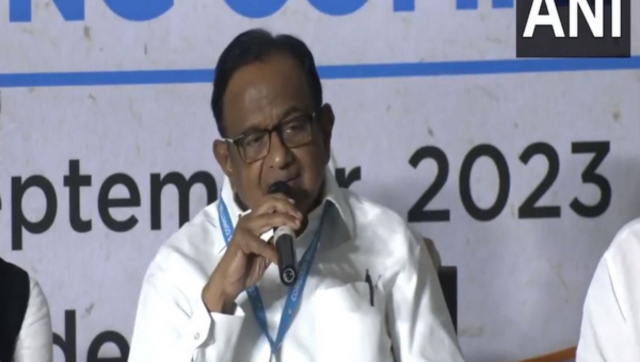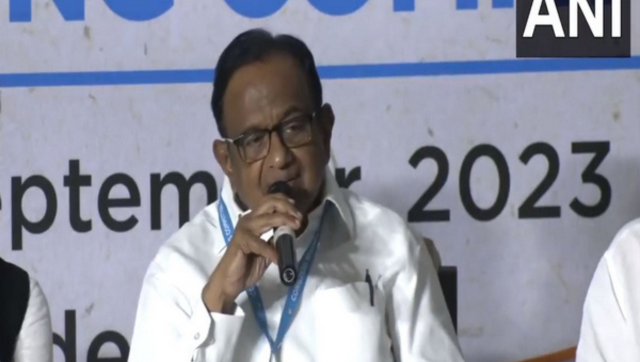The jury is out on whether the serial blasts in Pune on Wednesday were the suspected terrorists’ way of offering outgoing Home Minister P Chidambaram a thunderous sendoff or of welcoming his successor Sushil Kumar Shinde.
But given that Shinde had just moved in from the Power Ministry, had flailed around helplessly while two of the world’s largest power outages plunged large parts of India into darkness, and from his first pronouncements (in which he emphasised his Dalit identity) appeared to bring the same cluelessness to the Home Ministry as well, Shinde got the rough end of the stick rather more than Chidambaram.
In any case, for whatever reason, Chidambaram’s superior, even snooty, manner conveys a certain sense of authority in the way that Shinde’s grovelling, grateful manner doesn’t. And since he came into the Home Ministry soon after the 26/11attacks in Mumbai, succeeding a supremely incompetent Shivraj Patil, Chidambaram’s record in that office positive glowed in comparison to Patil’s.
There are those who point to the fact that there have been no major terrorist attacks on the scale of the 26/11 mayhem as validation of Chidambaram’s good work in the Home Ministry. Others flag his elevation of intelligence inputs from the field, and the seriousness that he accorded them, as being critical to securing India from such terror attacks.
Media commentator Ashok Malik, writing in The Times of India , characterises Chidambaram as India’s first “modern Home Minister” who introduced a certain “technocratic” expertise into a ministry that had earlier been viewed in an “outmoded” way.
Post-26/11 India, notes Malik, “needed to address juridical lacunae in meeting terrorism-related situations. It needed to construct a legal and threat-anticipation architecture that would integrate the state governments and New Delhi. It needed to ask itself about the right balance between anti-terror laws and civil liberties.”
A lawyer-politician like Chidambaram was eminently suited for this job, Malik claims. And even though Chidambaram’s efforts to establish a National Counter Terrorism Centre came a cropper, largely because he wasn’t able to persuade State governments on its merits, Malik reasons that he brought a certain seriousness to the job.
There may be much to commend about the fact that India did not witness another 26/11, but this overly upbeat assessment of Chidambaram’s record in the Home Ministry misses out on some of the areas in which Chidambaram was arguably less than deft.
Indicatively, under Chidambaram’s tenure in the Ministry, none of the major terrorist attack cases have been seen through to fruition, nor was he able to elevate internal defences against Naxalite/Maoist attacks in a marked manner. His exertions in the area of establishing a National Intelligence Grid have been less than successful, with tussles over jurisdictional authority over investigations and intelligence-sharing still notoriously rampant. As the Pune blasts earlier this week, and the other terror attacks in Mumbai, Delhi and Pune, established, there are still gaping holes in the intelligence-gathering mechanism.
On the other hand, Chidambaram expended a disproportionate amount of time in chasing the ghost of what he called “saffron terror”, when in fact the far graver threat perhaps lay elsewhere. It was a blatantly political project, rendered all the more perverse by the fact that it used internal security as a political plaything.
More recently, as the recent outbreak of violence in Assam revealed, there has been no effort on the part of the UPA government to acknowledge the gravity of the illegal immigration from Bangladesh, which is changing the demographics in large tracts of the Northeast and leading to conflagrations such as these.
Chidambaram’s tenure in the Home Ministry, and his skills as a lawyer, also saw the farcical procedure of India persuading Pakistan about its terrorist links to 26/11 by sending dossier after dossier, which were dismissed by Pakistani officials as “literature”. The volumes of literature thus accumulated have taken us nowhere nearer to securing the extradition of known terrorists, who still strut about in Pakistan. (More seriously, the Manmohan Singh government is actively rewarding Pakistan, without securing any its own demands.)
And on occasions, even the mindless ritual of drawing up ‘terrorism’ dossiers for Pakistan recoiled with embarrassing consequences, as when a person who was in Mumbai figured on a list of “terrorists” whom India wanted extradited from Pakistan.
It is, of course, true that Chidambaram was a switched-on Home Minister in the way that Shivraj Patil wasn’t – and Shinde is unlikely to be. Media reports have it that there is already a perceptible lowering of guard among Home Ministry officials, as babus sense a change in the work culture towards a more laidback style of working.
However, any fair assessment of Chidambaram’s tenure in the Home Ministry must perforce acknowledge these significant failings as well. Some home truths may not be palatable, but there is no merit in flinching away from them and presenting overly adulatory portrayals of our leaders.


)




)
)
)
)
)
)
)
)